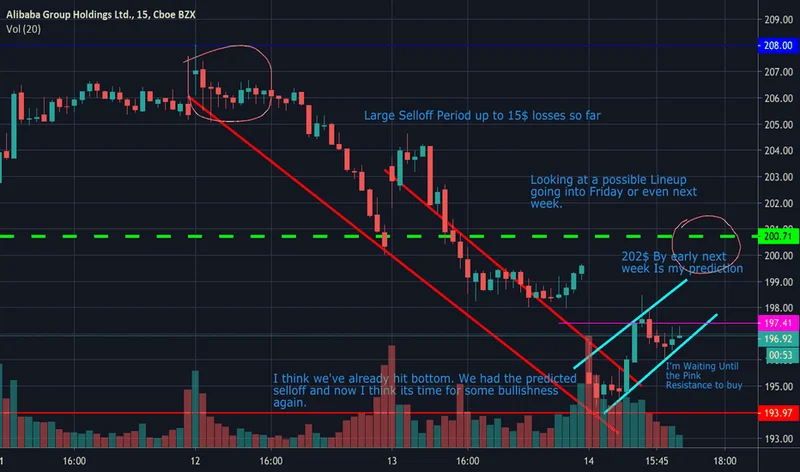AI Analyst's Alibaba Downgrade? A Glitch in the Matrix, Not the Future
Okay, folks, let's talk about Alibaba. BABA stock, to be exact. You've probably seen the headlines: an AI analyst at TipRanks, Rina Curatex (powered by OpenAI-4o, no less!), downgraded Alibaba from "Buy" to "Neutral," even trimming the price target. Now, Wall Street, bless their optimistic hearts, still sees plenty of upside, almost 24% according to TipRanks. But this AI, this digital oracle, is pumping the brakes. You can read more about the downgrade in this article: AI Analyst Downgrades Alibaba Stock (BABA) to Hold and Trims Price Target Despite Wall Street Optimism.
So, what gives? Should we all be hitting the panic button?
Nah. Not even close.
See, this isn't about Alibaba's fundamentals—which, by the way, are looking pretty darn good, with strong growth in AI cloud services and increasing demand for speedy delivery. No, this is about how we interpret the signals in a world increasingly shaped by artificial intelligence.
The AI Hype Machine vs. Human Intuition
Let's be clear: AI is a tool. A powerful one, yes, but still just a tool. And like any tool, its effectiveness depends on how we use it, what data we feed it, and, crucially, how we interpret its output. The TipRanks AI Stock Analysis gives Alibaba a score of 69 out of 100, citing strong financial performance but flagging "bearish technical indicators and valuation concerns." It's pulling in data, crunching numbers, and spitting out a judgment. But does it understand the nuances? Does it feel the pulse of the market? Does it grasp the potential?
I think not.
This reminds me of the early days of the internet. Remember all the doom-and-gloom predictions about how it would destroy communities and spread misinformation? Sure, some of that happened, but look at the incredible innovation, the connection, the sheer explosion of human creativity that the internet unleashed! AI is the same. It's a force multiplier, but it needs human guidance, human vision.
And here's where the human analysts on Wall Street might just have a point. They see the bigger picture: Alibaba's strategic partnerships, its expansion into fast-growing tech areas, its solid Q1 FY26 results with revenue hitting 247.7 billion yuan (that's $34.6 billion, for those of us keeping score at home!), with cloud sales climbing 26% year-over-year.

But even those numbers don't fully capture the potential. So, what exactly is the potential?
Alibaba's not just an e-commerce giant; it's a technological ecosystem. It's a platform for innovation, a launchpad for entrepreneurs, a gateway to the world's largest consumer market. It’s not just selling stuff; it's building the infrastructure of the future. And that, my friends, is something an AI, focused on short-term metrics and technical indicators, simply can't quantify.
Of course, there are challenges. Weak free cash flow, competition in quick-commerce, rising debt—the AI analyst flags these, and rightfully so. But these are challenges that can be addressed, obstacles that can be overcome. They're not existential threats. They're just part of the journey.
This whole situation made me think of the early days of electric cars. Remember how everyone was so focused on range anxiety and charging infrastructure? Now look at Tesla (TSLA), a company that not only solved those problems but redefined the entire automotive industry. It's not just about the technology; it's about the vision, the leadership, the unwavering belief in a better future.
And that's what I see in Alibaba. A company with the vision, the resources, and the determination to shape the future of commerce and technology.
Now, you might be thinking, "Okay, Dr. Thorne, that's all well and good, but what about the report alleging that Alibaba provided tech support to the Chinese military?" Yeah, that's a serious allegation, no doubt about it. The Financial Times cited a White House national security memo claiming Alibaba gave the Chinese government and the People's Liberation Army access to customer data, including IP addresses, WiFi information, and payment records, as well as AI-related services. Alibaba denies it, calling the allegations false and claiming the information was leaked to malign the company. You can read more about the White House allegations White House says Alibaba provides tech support to Chinese military; shares fall By Investing.com.
Honestly, it's a mess. But even if these allegations are true, does it negate all the positive aspects and potential of the company? I don't think so. It highlights the ethical tightrope that tech companies must walk, especially those operating in a globalized world with complex geopolitical dynamics. It's a reminder that technology is never neutral; it's always shaped by the values and intentions of those who create and control it.
And that's why human oversight, human judgment, and human values are more important than ever. We can't blindly trust the algorithms; we need to question them, challenge them, and ultimately, use them to enhance our own understanding and decision-making.
AI's Just a Tool; Vision is Still Human
This AI downgrade isn't a sign of Alibaba's impending doom. It's a sign of the times—a reminder that we're living in a world where algorithms are increasingly shaping our perceptions and decisions. It's a call to action, urging us to be more critical, more thoughtful, and more human in how we interpret the data and shape the future. The future remains bright, but it's up to us to make sure that it is guided by human values.
